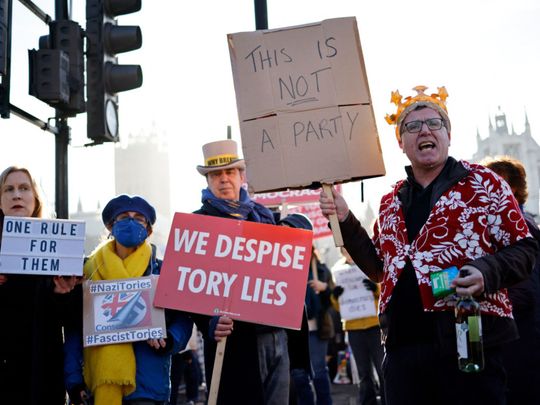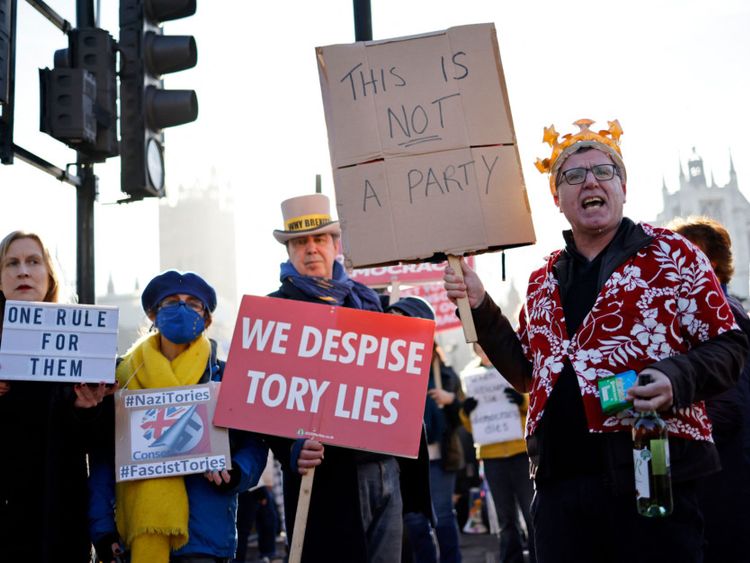
London: What were you doing on May 20, 2020?
That’s the question people around Britain are asking for one very simple reason: On that day, Boris Johnson attended a party hosted at 10 Downing Street, his office and residence.
It is at least the third time the government reportedly broke the strict social distancing rules it had imposed on the nation.
A leaked email with the words “bring your own booze!” suggests Johnson’s private secretary invited some 100 staff to a party at the garden of the prime minister’s residence. An estimated 40 people reportedly took part in the event - including Johnson and his wife, Carrie. On Wednesday, Johnson apologized for attending the party but said that at the time, he “believed this was a work event.”
The news has enraged and devastated Britons because May 2020 was a time when citizens were being urged to stay at home and limit social contact to stop the spread of a virus that would go on to claim more than 150,712 lives in the United Kingdom.
Hundreds have taken to social media to recall their activities around the time of the party - including socially distanced funerals, isolating hospital visits, and grieving relatives who had died far from their loved ones because of the restrictions.
“It feels like such a betrayal,” 44-year-old Donna Speed told The Washington Post during a tearful interview on Tuesday. “The people flouting the rules were meant to keep us safe.”
On the evening of May 20, the same day Johnson attended Number 10s boozy gathering - and the same day at least 353 people died of the coronavirus - Speed found her mother, whom she had not seen for months because of the restrictions, dead and alone in her home.
Brits were allowed to meet only one other person from outside their household, and this had to take place at an outdoors public place, with two-meter (six-and-a-half-foot) social distancing in place, meaning no physical contact was allowed. People were not allowed to go into one another’s homes or gardens. At the time, there was no vaccine.
Speed and her three siblings had stuck to the social distancing rules despite their concerns for their mother, 63-year-old Frances Speed, who had been suffering from a stomach ulcer and living alone since the death of her husband, Robert, from cancer 18 months earlier.
Losing loved ones
By May 20, Donna Speed made the difficult decision to drive 40 minutes to her mother’s house in Bath. “She hadn’t answered our calls,” she explained. “I expected her to be asleep.”
Instead, she found her mother had died at home, after her stomach ulcer ruptured.
Frances Speed had been given medication from doctors - but was reluctant to seek further treatment because of the government’s continuous reminders that health-care workers were being pushed to their limits, her daughter said.
“She didn’t want to pressure the NHS,” Donna Speed said, adding that her mother had been so thankful for the care her late husband had received in the hospital during his illness that she did not want to be a burden on the free health service - which many in Britain regard as a national treasure.
Fifteen people attended Frances Speed’s funeral on June 8, with family members in Ireland unable to attend because of travel restrictions. Despite their grief, the family stuck to the rules on attendees numbers and social distancing. “We wanted to do our bit,” Donna Speed said, adding that she was unable to embrace her three sisters at the funeral due to social distancing measures.
Now, she says, “I do so wish that I had visited her in lockdown. I would have seen that she needed medical attention, and it could have saved her life.”
“I’d give anything to go back and give her a hug,” she continued.
The sense of betrayal has also been echoed by other Britons, including JP Asher, who lost his wife, 41, to a rare and aggressive form of cancer. The couple have two children together.
“This was on May 20, 2020. The day before was my wife’s funeral,” Asher wrote on Twitter on Tuesday as he reacted to the news. “I and a handful of relatives stood at distance near the grave,” he recalled. “Her family watched over Zoom.”
'Couldn't hold my mother's hand'
For Harriet Hall, that was the day she and a few others gathered to say goodbye to her grandmother, who died alone in a nursing home on May 12.
“On 20 May, 8 of us gathered for her funeral. It was socially distant and there was no wake, as per the rules,” Hall tweeted. “I couldn’t hold my mother’s hand as she said goodbye to hers.”
“Seeing that a BYOB garden party was going on in Downing St while we stood in a stark, empty crematorium and said goodbye to the most brilliant woman, without being able to comfort one another and my brother had to attend over zoom. . . ouch.”
Both Hall and Asher confirmed details of the events to The Washington Post but declined to be interviewed further, saying they wanted privacy for their families.
It is not clear whether the fallout will damage Boris Johnson - who has weathered several political scandals, as well as accusations that he bungled the government’s response to the pandemic. However, it’s clear the scandal has devastated and angered many Britons who have suffered during the pandemic, and keenly violated their sense of fairness.
“Could there be a more disgraceful example of ‘one rule for them, and another rule for the rest of us’?” Hannah Brady, spokesperson for Covid-19 Bereaved Families for Justice, a group established to support the loved ones of those who died in Britain, said in a statement on Tuesday.
Brady was among a group of grieving relatives who met with the prime minister in September last year, after her father, a “fit and healthy” key worker, died of covid-19 at the age of 55. He died on May 16 - just four days before Johnson’s secretary allegedly sent out the garden party invitations.
“I sat in that same Garden, looked the Prime Minister in the eyes and told him how my dad had died. He told me he had ‘done everything he could’ to protect my Dad, knowing that he had partied in that same spot the very day that Dad’s death certificate was signed. It makes me feel sick to think about it,” she said.
In recent weeks, Johnson has repeatedly denied any rules were broken and ordered an internal inquiry by Britain’s top civil servant, Simon Case.
Angela Rayner, deputy leader of the opposition Labour Party, has called the gatherings “disgraceful” and said Johnson “should be ashamed.”
And, notably, some local politicians within Johnson’s own party are now saying, on the record, that he should resign.
Anthony Mullen, a local councilor in Sunderland, a city in northern England, told the BBC: “I think this is such an atrocity, I can’t see how he can survive . . . It is now a question of the scale of the wrongdoing rather than whether there has been any.”












